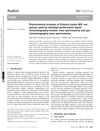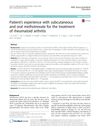 92 citations,
June 2005 in “Journal of Investigative Dermatology”
92 citations,
June 2005 in “Journal of Investigative Dermatology” All-trans retinoic acid causes hair loss by increasing TGF-β2 in hair follicle cells.
 92 citations,
January 1998 in “Dermatology”
92 citations,
January 1998 in “Dermatology” Ketoconazole shampoo improves hair growth and reduces oil similarly to minoxidil in male pattern hair loss.
 78 citations,
February 2004 in “British Journal of Dermatology”
78 citations,
February 2004 in “British Journal of Dermatology” Melatonin helps hair growth in women with hair loss.
 65 citations,
March 1999 in “Urology”
65 citations,
March 1999 in “Urology” Finasteride didn't significantly improve ICPPS symptoms, more research needed.
 58 citations,
January 2013 in “The Journal of Clinical Endocrinology and Metabolism”
58 citations,
January 2013 in “The Journal of Clinical Endocrinology and Metabolism” Obese women with PCOS show a male-like pattern in certain fat tissue gene expressions.
 58 citations,
January 2006 in “Skin Pharmacology and Physiology”
58 citations,
January 2006 in “Skin Pharmacology and Physiology” High levels of testosterone and 5α-DHT can lead to cell death in cells important for hair growth.
 53 citations,
April 2021 in “Cell Host & Microbe”
53 citations,
April 2021 in “Cell Host & Microbe” Skin bacteria, specifically Staphylococcus aureus, help in wound healing and hair growth by using IL-1β signaling. Using antibiotics on skin wounds can slow down this natural healing process.
 53 citations,
January 2009 in “Journal of Investigative Dermatology”
53 citations,
January 2009 in “Journal of Investigative Dermatology” UVB radiation harms hair growth and health, causing cell death and other changes in human hair follicles.
 52 citations,
May 2017 in “Journal of Cosmetic Dermatology”
52 citations,
May 2017 in “Journal of Cosmetic Dermatology” PRP injections improve hair density and thickness in women with hair loss.
 51 citations,
May 2010 in “Journal of Drug Targeting”
51 citations,
May 2010 in “Journal of Drug Targeting” Transcutol-containing vesicles improve minoxidil's skin penetration and hair growth promotion.
 49 citations,
February 2008 in “Stem Cells”
49 citations,
February 2008 in “Stem Cells” Wnt10b helps blood stem cells grow after injury.
 47 citations,
February 2014 in “Aaps Pharmscitech”
47 citations,
February 2014 in “Aaps Pharmscitech” Improved hair loss treatment using special particles and surfactants.
 44 citations,
March 2008 in “European journal of endocrinology”
44 citations,
March 2008 in “European journal of endocrinology” Women with PCOS have lower ghrelin levels and a weaker response to sugar, which might affect their feeling of fullness and lead to overeating.
 40 citations,
March 2018 in “Aesthetic Surgery Journal”
40 citations,
March 2018 in “Aesthetic Surgery Journal” New treatment combining PRP and SVF increases hair density in 6-12 weeks for androgenetic alopecia patients.
 38 citations,
January 2013 in “Analyst”
38 citations,
January 2013 in “Analyst” The study found that Ziziphus jujuba seeds contain beneficial compounds for treating insomnia and anxiety and that the methods used are effective for assessing their quality.
 37 citations,
July 2010 in “International Journal of Trichology”
37 citations,
July 2010 in “International Journal of Trichology” Hair loss affects quality of life, self-esteem, and confidence, but younger patients cope better.
 37 citations,
January 2008 in “Gynecological Endocrinology”
37 citations,
January 2008 in “Gynecological Endocrinology” Shorter CAG repeats in a specific gene may increase male hormone activity and symptoms like acne and excess hair in women with PCOS.
 36 citations,
April 2013 in “Cell and Tissue Research”
36 citations,
April 2013 in “Cell and Tissue Research” Bone-marrow and epidermal stem cells help heal wounds differently, with bone-marrow cells aiding in blood vessel formation and epidermal cells in hair growth.
 36 citations,
August 2011 in “Experimental Dermatology”
36 citations,
August 2011 in “Experimental Dermatology” Eccrine sweat gland's clear cells likely cause excessive sweating in hyperhidrosis.
 27 citations,
July 2008 in “Neuroscience”
27 citations,
July 2008 in “Neuroscience” Finasteride given to baby rats causes anxiety-like behavior and worsens learning from punishment in adult rats.
 25 citations,
November 2001 in “Kidney International”
25 citations,
November 2001 in “Kidney International” Male hormones worsen kidney transplant damage, but blocking them helps.
 23 citations,
September 2016 in “BMC musculoskeletal disorders”
23 citations,
September 2016 in “BMC musculoskeletal disorders” Methotrexate for rheumatoid arthritis often causes side effects like diarrhea, fatigue, and hair loss, especially at higher doses.
 23 citations,
January 2008 in “Clinics in dermatology”
23 citations,
January 2008 in “Clinics in dermatology” Diet changes can help reduce acne by limiting certain hormones.
 21 citations,
June 2019 in “Dermatologic Surgery”
21 citations,
June 2019 in “Dermatologic Surgery” Platelet-rich plasma (PRP) treatment has been found effective in promoting hair growth for alopecia patients, with minimal side effects like temporary pain and redness.
 21 citations,
January 1991 in “Dermatology”
21 citations,
January 1991 in “Dermatology” Men with male pattern hair loss have different levels of certain hormones compared to men without hair loss.
 20 citations,
October 2008 in “Archives of dermatological research”
20 citations,
October 2008 in “Archives of dermatological research” Angiogenin helps hair grow by stimulating cell growth and blood vessel formation.
 20 citations,
November 2005 in “Journal of Investigative Dermatology Symposium Proceedings”
20 citations,
November 2005 in “Journal of Investigative Dermatology Symposium Proceedings” IFN-γ and IL-2 are important for T cell activation in hair loss in mice.
 19 citations,
February 2012 in “International Journal of Urology”
19 citations,
February 2012 in “International Journal of Urology” In Japan, sex reassignment surgery for gender identity disorder faces challenges and needs better medical support and education.
 19 citations,
October 1994 in “Tumori Journal”
19 citations,
October 1994 in “Tumori Journal” As of 1994, treatments for liver cancer had not significantly improved patient survival.
 18 citations,
July 2011 in “Journal of The American Academy of Dermatology”
18 citations,
July 2011 in “Journal of The American Academy of Dermatology” Familial factors affect hair loss types in Koreans, with M type in men, L type in women, and paternal factors influencing male hair loss more.





























